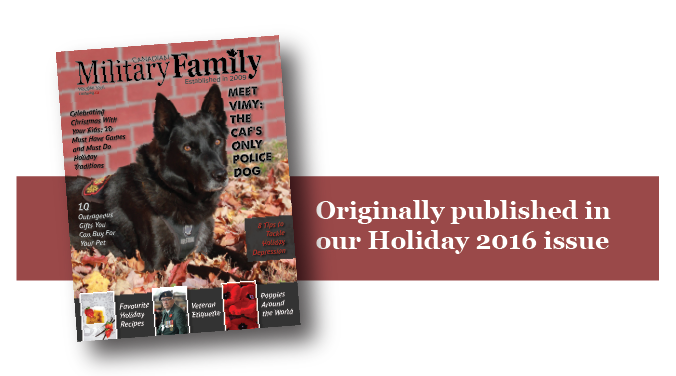Military Etiquette
Thanking Military Members and Their Families
 During Veteran’s Week many years ago, a couple of people approached my uniformed husband at the grocery store to thank him for his service. My heart swelled with pride at the sight. Then, a woman approached me and thanked me too. I was overcome with emotion, and all I could do was smile and nod in appreciation.
During Veteran’s Week many years ago, a couple of people approached my uniformed husband at the grocery store to thank him for his service. My heart swelled with pride at the sight. Then, a woman approached me and thanked me too. I was overcome with emotion, and all I could do was smile and nod in appreciation.
Showing gratitude to another human is powerful. It’s so powerful in fact, that it sometimes compels people to approach complete strangers to express their appreciation, especially, around Remembrance Day.
Showing gratitude to current or former military members, or their families, requires sensitivity. We need to be respectful and show empathy so that we don’t unintentionally offend or upset anyone.
Military life is unique, and with it comes its own set of unique stresses. Even the military itself can be a divisive topic at times. Nevertheless, the common thread that binds members and their families is service and sacrifice. So regardless of your position on war, the military, or our government’s policies, if you’re compelled to extend appreciation to military members and their families, make sure you keep the tone respectful.
Here are some things to keep in mind:
- Keep your engagement brief. Some members might take the opportunity to strike up a conversation with you, but others may not. Don’t take it personally.
- Be aware of personal space. Extending a hand in gratitude is common, but grabbing someone’s hand is disrespectful. If a person struggles to meet your hand, go ahead and gently take it in yours.
- Keep it simple and sincere. “Thank you for your service” is enough.
- Listen. Without judgment. Without offering your views on politics or policy. Without suggesting what we should have done. Without launching into question after question. There’s a lot to be learned just from listening.
- Don’t compare or attempt to relate. If someone tells you that they haven’t slept in days because of a physical or mental injury, don’t compare that to the sleep deprivation you experienced after the birth of your children. Responding with “I’m sorry you’re going through this,” or, “I’m sorry you’re suffering,” is all that’s needed. Injuries are unique to every individual.
- Realize that not all injuries are visible. Someone may look fine, but mental illness is often hard to see. So, while a comment like, “I’m grateful you came back safe and sound,” sounds kind and benign, it might inadvertently generate resentment.
- Stifle your own curiosity. For example, you don’t need to know if the member lost any friends. You don’t need to ask a spouse invasive questions. Asking anyone to re-live stressful or traumatic events out of interest is unnecessary and potentially harmful.
- If, like me, you find yourself on the receiving end of gratitude, be as gracious as you can be, even if someone says something upsetting or unsettling. Take the high road. In my own experience at the grocery store, I wish I could have found my voice to respond with a “Thank you, I appreciate that.”
Finally, if you find yourself moved by gratitude, don’t hesitate to express it. You never know what a difference you may make to someone’s day.










